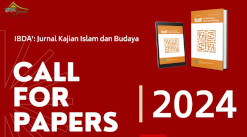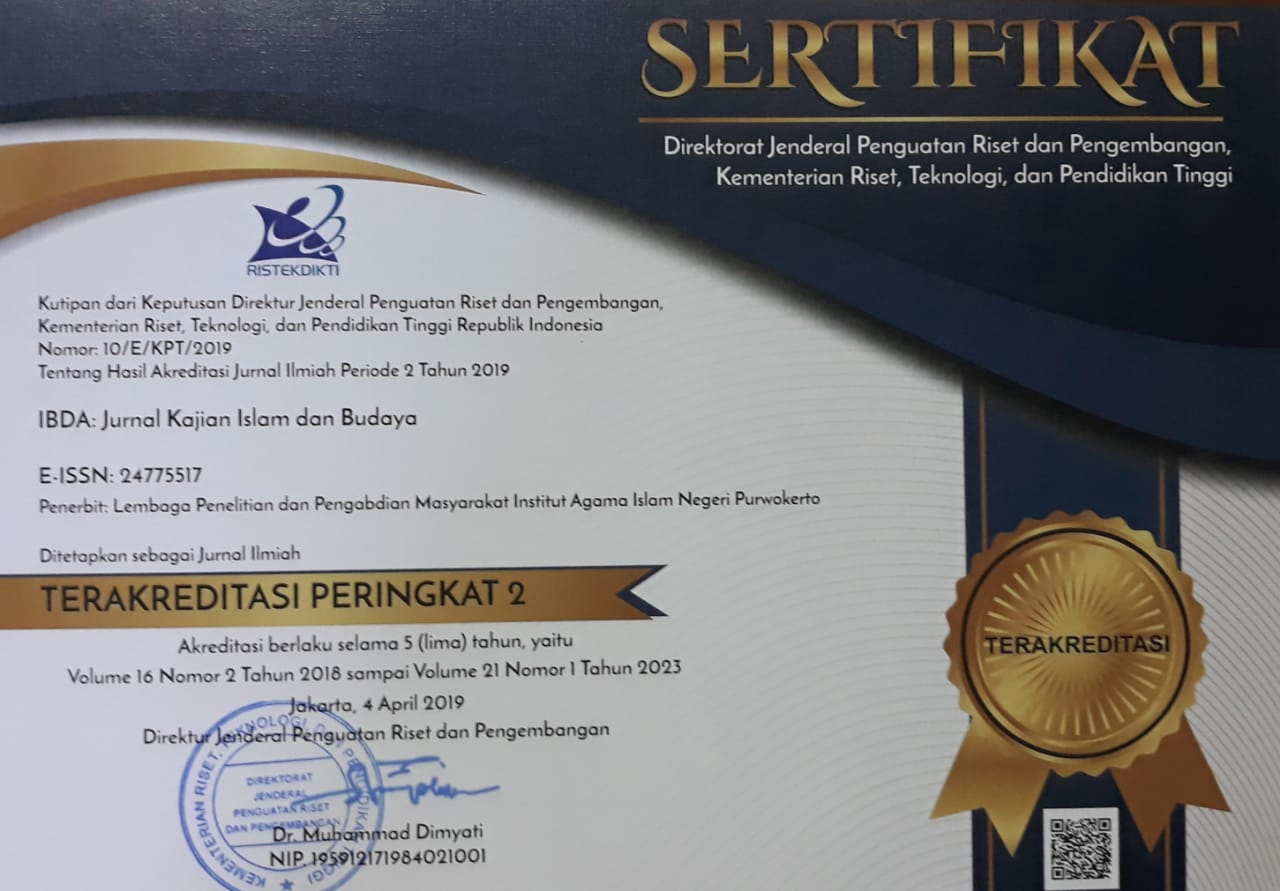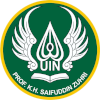HUKUM ISLAM DAN BUDAYA LOKAL DI MASYARAKAT MUSLIM PATTANI THAILAND (Integrasi, Konflik dan Dinamikanya)
DOI:
https://doi.org/10.24090/ibda.v14i1.524Keywords:
Muslim-Melayu, Thai-Budha, assimilasi, resistensiAbstract
The presence of Thai people in Pattani through annexation or conquest, from the Kingdom of Siam to Thailand have changed the socio-cultural Muslim community. Thai Buddhist nation perform a lot of cultural assimilation of Malay Muslim Pattani. The assimilation pursued through politics, education, culture, and law. Political stripes do with the ideology developed, namely "nation, king, religion" that subjecting all citizens into one nationalism. Education path is done through standardized education policy, namely the obligation to teach the language and history of Thai and Buddhist teachings. Cultural path had taken through migration north to south and the formation of "peaceful village". The last path is the law through legal intervention in the form of restrictions on the entry into force of Islamic law and the jurisdiction of Dato 'Yuthithams, the elimination of Islamic justice as consolidated by the civilian justice and law enforcement Thai civilians in Pattani. This assimilation project met with resistance from Pattani Muslim community, as it is considered as an attempt to deculturate Malay Muslim culture that identifies them. The aim of this resistance is to get autonomy in Pattani province to the desire to become an independent state.Abstrak Kehadiran bangsa Thai di Pattani melalui aneksasi atau penaklukan, mulai dari Kerajaan Siam hingga berganti menjadi Thailand, mengubah sosio-kultur masyarakat Muslim. Bangsa Thai yang beragama Budha banyak melakukan assimilasi terhadap kebudayaan Muslim Melayu Pattani. Assimilasi tersebut ditempuh melalui jalur politik, pendidikan, budaya, dan hukum. Jalur politik dilakukan dengan mengembangkan ideologi “nation, king, religion†yang menundukkan semua warga negara ke dalam satu nasionalisme. Jalur pendidikan dilakukan melalui kebijakan standarisasi pendidikan, yaitu kewajiban mengajarkan bahasa dan sejarah Thai serta ajaran Budha. Jalur budaya ditempuh melalui program migrasi penduduk utara ke selatan dan pembentukan “peaceful villageâ€. Jalur terakhir adalah jalur hukum yang dilakukan melalui intervensi hukum berupa pembatasan berlakunya hukum Islam serta kewenangan Dato’ Yuthithams, penghapusan peradilan Islam karena disatukan dengan peradilan sipil dan pemberlakuan hukum sipil Thai di Pattani. Proyek assimilasi ini mendapatkan perlawanan dari masyarakat Muslim Pattani, karena dianggap sebagai upaya dekulturisasi kultur Melayu Muslim yang menjadi identitas mereka. Tujuan perlawanan ini adalah untuk mendapatkan otonomi di wilayah Pattani hingga keinginan untuk menjadi negara yang merdeka.Downloads
Download data is not yet available.
References
Abdullah, Auni bin Haji. 2001. Islam dan Perdagangan dalam Sejarah Alam Melayu. Malaysia: Darulfikir SDN BHO.
Abdul Mani, Lutfee. 2013. “Conflict Resolution: A Case Study of the Separatist Movement in the Southern Border Provinces of Thailand, Qudus International Journal of Islamic Studies, vol.1, Number 1, January-June 2013.
American Foreign Policy Council. 2013. “Thailandâ€, World Almanac of Islamism.
Chonlaworn, Piyada. 2014. “Contesting Law and Order: Legal and Judicial Reform in Southern Thailand in the Late Nineteenth to Early Twentieth Centuryâ€, Southeast Asia Studies, vol. 3 No. 3, December 2014.
Dorloh, Sulaiman. 2009. “The Code of Muslim Family Law and Law of Inheritance (1941) as Applicable in the Provincial Courts of Southern Four Border Provinces of Thailand: Issues and Prospectsâ€, Journal of Fiqh, No. 6 (2009).
Eriksen, Thomas H. 1993. Ethnicity abd Nationalism: Anthropological Perpectives. Finland: Pluto Press.
Feigenblatt, Otto von. “The Muslim Malay Community in Southern Thailand: A Small People Facing Existensial Uncertaintyâ€, Nova Southeastern University, paper unpublushed.
Intajalle, Feirul Maliq and etc. 2012. “Islamic Inheritance Law among Muslim Minority Countries in Southeast Asiaâ€, Middle East Journal of Scientific Research 12 (1), 2012.
Jeppsson, Jon. 2008. Annexation and Assimilation: An Ethnic Approach to the Roots of Conflict in Thailand’s Deep South. Lund: University Department of Political Science.
Herriman, Michael. 2005. “Language, Etnicity, Culture and Conflicts in Southern Thailandâ€, NUCB JLCC, 7, 1 (2005).
Neelapaijit, Angkhana. 2009. “Roles and Challenges for Muslim Women in the Restive Southern Border Provinces of Thailandâ€, paper at the†Conference on Religious Activism & Women’s Development in Southeast Asia: Highlighting Impediments, Exploring Opportunities, 20th & 21st November 2009.
Pitsuwan, Surin. 1985. Islam and Malay Nationalism; A Case Study of the Malay Muslims of Southern Thailand. Bangkok: Thai Kadi Research Institute, Tommasat University.
Sarkar, Diptendu. 2014. “Religious Minority, Education and Separatism in South Thailandâ€, paper presented at “the 12th International Conference on Thai Studies†University of Sydney, April, 22-24, 2014.
Walker, Dennis. 2005. “Conflict Between the Thai and Islamic Cultures in Southern Thailand (Patani) 1948-2005, Islamiyyat Universiti Kebangsaan Malaysia, 27 (1), 2005.
Williams, Timothy. 2011. “Beyond Development and Counter-Insurgency; Searching for a Political Solution to the Malay Secessionist Conflict in Southern Thailandâ€, Scholar Report, London School of Economics and Political Science Asia Research Centre (ARC)-Thailand Government Scholarship.
Yulianto, Paulus Rudolf. 2004. “Integration of Pattani Malays: a Geopolitical Change Perpectiveâ€, dalam Multiculturalism, Separatism and National Building in Thailand. Indonesia: Pusat Penelitian Sumber Daya Nasional, 2004.
---------------------------------, “Integrasi Muslim Patani: Reidentitas Sosial atas Dominasi Nasional Thailandâ€, dalam www.digilib.uin-suka.ac.id
Yusuf, Imtiyaz. 2009. “Ethnoreligious and Political Dimensions of the Southern Thailand Conflictâ€, dalam Amit Pandya and Ellen Laipson (eds), Islam and Politics, Renewal and Resistance in Muslim World. Washington DC: The Henry L. Stimson Center.
Abdul Mani, Lutfee. 2013. “Conflict Resolution: A Case Study of the Separatist Movement in the Southern Border Provinces of Thailand, Qudus International Journal of Islamic Studies, vol.1, Number 1, January-June 2013.
American Foreign Policy Council. 2013. “Thailandâ€, World Almanac of Islamism.
Chonlaworn, Piyada. 2014. “Contesting Law and Order: Legal and Judicial Reform in Southern Thailand in the Late Nineteenth to Early Twentieth Centuryâ€, Southeast Asia Studies, vol. 3 No. 3, December 2014.
Dorloh, Sulaiman. 2009. “The Code of Muslim Family Law and Law of Inheritance (1941) as Applicable in the Provincial Courts of Southern Four Border Provinces of Thailand: Issues and Prospectsâ€, Journal of Fiqh, No. 6 (2009).
Eriksen, Thomas H. 1993. Ethnicity abd Nationalism: Anthropological Perpectives. Finland: Pluto Press.
Feigenblatt, Otto von. “The Muslim Malay Community in Southern Thailand: A Small People Facing Existensial Uncertaintyâ€, Nova Southeastern University, paper unpublushed.
Intajalle, Feirul Maliq and etc. 2012. “Islamic Inheritance Law among Muslim Minority Countries in Southeast Asiaâ€, Middle East Journal of Scientific Research 12 (1), 2012.
Jeppsson, Jon. 2008. Annexation and Assimilation: An Ethnic Approach to the Roots of Conflict in Thailand’s Deep South. Lund: University Department of Political Science.
Herriman, Michael. 2005. “Language, Etnicity, Culture and Conflicts in Southern Thailandâ€, NUCB JLCC, 7, 1 (2005).
Neelapaijit, Angkhana. 2009. “Roles and Challenges for Muslim Women in the Restive Southern Border Provinces of Thailandâ€, paper at the†Conference on Religious Activism & Women’s Development in Southeast Asia: Highlighting Impediments, Exploring Opportunities, 20th & 21st November 2009.
Pitsuwan, Surin. 1985. Islam and Malay Nationalism; A Case Study of the Malay Muslims of Southern Thailand. Bangkok: Thai Kadi Research Institute, Tommasat University.
Sarkar, Diptendu. 2014. “Religious Minority, Education and Separatism in South Thailandâ€, paper presented at “the 12th International Conference on Thai Studies†University of Sydney, April, 22-24, 2014.
Walker, Dennis. 2005. “Conflict Between the Thai and Islamic Cultures in Southern Thailand (Patani) 1948-2005, Islamiyyat Universiti Kebangsaan Malaysia, 27 (1), 2005.
Williams, Timothy. 2011. “Beyond Development and Counter-Insurgency; Searching for a Political Solution to the Malay Secessionist Conflict in Southern Thailandâ€, Scholar Report, London School of Economics and Political Science Asia Research Centre (ARC)-Thailand Government Scholarship.
Yulianto, Paulus Rudolf. 2004. “Integration of Pattani Malays: a Geopolitical Change Perpectiveâ€, dalam Multiculturalism, Separatism and National Building in Thailand. Indonesia: Pusat Penelitian Sumber Daya Nasional, 2004.
---------------------------------, “Integrasi Muslim Patani: Reidentitas Sosial atas Dominasi Nasional Thailandâ€, dalam www.digilib.uin-suka.ac.id
Yusuf, Imtiyaz. 2009. “Ethnoreligious and Political Dimensions of the Southern Thailand Conflictâ€, dalam Amit Pandya and Ellen Laipson (eds), Islam and Politics, Renewal and Resistance in Muslim World. Washington DC: The Henry L. Stimson Center.
Downloads
Published
2016-05-30
How to Cite
sodiqin, ali. (2016). HUKUM ISLAM DAN BUDAYA LOKAL DI MASYARAKAT MUSLIM PATTANI THAILAND (Integrasi, Konflik dan Dinamikanya). IBDA` : Jurnal Kajian Islam Dan Budaya, 14(1), 31–50. https://doi.org/10.24090/ibda.v14i1.524
Issue
Section
Articles
License
Authors who publish with this journal agree to the following terms:
- Authors retain copyright and grant the journal right of first publication with the work simultaneously licensed under a Creative Commons Attribution-ShareAlike License a that allows others to share the work with an acknowledgement of the work's authorship and initial publication in this journal.
- Authors are able to enter into separate, additional contractual arrangements for the non-exclusive distribution of the journal's published version of the work (e.g., post it to an institutional repository or publish it in a book), with an acknowledgment of its initial publication in this journal.
- Authors are permitted and encouraged to post their work online (e.g., in institutional repositories or on their website) before and during the submission process, as it can lead to productive exchanges, as well as earlier and greater citation of published work (See The Effect of Open Access).

















